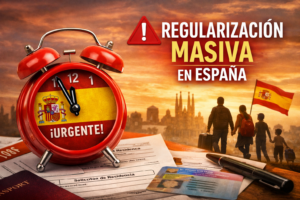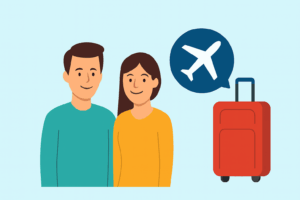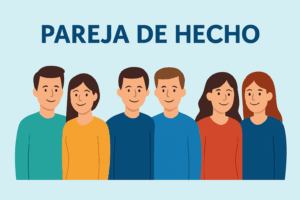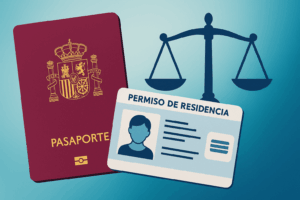So, you’ve just arrived in Spain. What’s next?
8 Essential Steps for Foreigners When Moving to Spain
After months of paperwork, flights, and packing, you’ve finally made it. But once you get off the plane and settle in, the big question arises: what should you do when arriving in Spain as a foreigner?
Here’s a step-by-step guide.
What to Do When You Arrive in Spain as a Foreigner in 2025
1. Register your address with the local town hall (Empadronamiento)
Registration on the municipal census (empadronamiento) is one of the first procedures every foreigner must complete in Spain. It is mandatory if you plan to stay for more than a few months and is essential for accessing public services.
Where is it done?
At the city council (ayuntamiento).
What do you need?
Your passport, a rental contract, or written authorization from the property owner.
Getting registered is necessary to apply for your NIE, access the public healthcare system, enroll children in school, and carry out many other important procedures in Spain.
2. Open a Bank Account as a Foreigner
Having a bank account in Spain as a foreigner is very useful for making payments, receiving transfers, collecting salaries, or setting up direct debits for bills. It also helps reduce the costs of international transactions with foreign banks. In some immigration procedures, holding a Spanish bank account can also serve as additional proof of residence and integration in Spain.
Some banks allow you to open an account with just your passport, while others require an NIE or a certificate of residence (empadronamiento). There are also specific accounts designed for new residents or expatriates.
3. Get a Spanish SIM Card
One of the first practical steps upon arrival is getting a Spanish phone number. You can choose between a prepaid SIM card or a monthly contract. Major providers offer packages for new residents. For a contract, you will usually need to provide your NIE or a Spanish bank account.
4. Access the Public Healthcare System
To use the public healthcare system in Spain, you need to be registered (empadronado) and apply for your Individual Health Card (TSI). While the main reason for having healthcare coverage is, of course, to protect your health and be covered in case of any unforeseen event, in some immigration procedures it can also serve as additional proof of your residence and stay in Spain.
Access is free in most cases. You can also choose to take out temporary private insurance. In Catalonia, the system is known as CatSalut.
5. Find Housing Safely: Rent or Buy
The real estate market in Spain is broad and highly dynamic, especially in major cities. For that very reason, there are also numerous cases of fraud and risky situations, particularly when the search or negotiation is done privately and without legal advice.
If you are planning to rent or buy a property, we strongly recommend taking extra precautions:
-
Never make online payments before signing a contract.
-
Verify the identity of the property owner or real estate agent.
-
Read all the contract terms carefully before making any commitment.
The most well-known and widely used website for finding housing is Idealista, although you can also go directly through professional real estate agencies.
At XLegalZ Extranjería S.L., we always recommend having the support of a specialized lawyer throughout the entire process, whether you are renting or buying a property. A legal review can save you from many problems in the future.
6. Transportation and Mobility in Spain
Public transportation in Spain is efficient and affordable, making it ideal while you organize your immigration procedures. Cards such as T-usual, T-jove, or T-casual let you travel by metro, bus, and train. Use apps like Moovit, Google Maps, or Renfe Cercanías to get around more easily.
Are you a fan of cycling? In many cities, there are public bike services such as Bicing in Barcelona.
7. Spanish Customs and Culture
To better integrate, it’s also important to get familiar with the local culture. Spain has its own rhythm and style:
-
People eat late: lunch is usually between 2:00–3:30 pm and dinner… after 9:00 pm! If you dine at 7:00, you’ll probably be alone in the restaurant.
-
Expressions you’ll hear a lot: “vale,” “ya está,” “buenooo…,” “a ver…,” and “no pasa nada” (even if something actually is happening).
-
Social interactions are usually informal: most people use tú instead of usted, greetings often include one or two kisses (yes, sometimes even at the first professional meeting).
-
Punctuality is… let’s say flexible. If someone says “at 5,” it might mean 5:15. If they say “I’m on my way,” they may still be at home. (But in our office this rule doesn’t apply—we’re Swiss with a watch!)
-
Coffee is not to be rushed. Leaving right after paying the bill is frowned upon. The sobremesa—lingering at the table after a meal—is sacred!
-
Sundays are for doing nothing… except eating with family, going to the beach, or watching football.
That said, when it comes to administrative procedures, public offices, or legal matters, it’s best to remain respectful and formal. Here, a casual “vale, tío” won’t work.
8. Regularize Your Legal Status in Spain
Although all the previous steps are essential, the most important one for any foreigner in Spain is to regularize their legal status. Living without proper documentation limits your rights and opportunities. Legalizing your stay in Spain allows you to access formal employment, social security, full healthcare, and eventually Spanish nationality. There are different pathways: studies, social arraigo, employment-based arraigo, family arraigo, asylum, civil partnerships, among others.
At XLegalZ Extranjería S.L., we are a law firm specialized in immigration and Spanish nationality, with over 20 years of experience helping people like you legalize their status in Spain safely and successfully.
Regularizing your situation in Spain is the most important step to start your new life with confidence. At XLegalZ Extranjería, an immigration law firm in Barcelona with more than 20 years of experience, we assist you in every procedure: NIE, residence permits, arraigo, visas, and Spanish nationality.
Have you just arrived in Spain and don’t know where to start?
Contact us and take your first legal steps with peace of mind and confidence.





